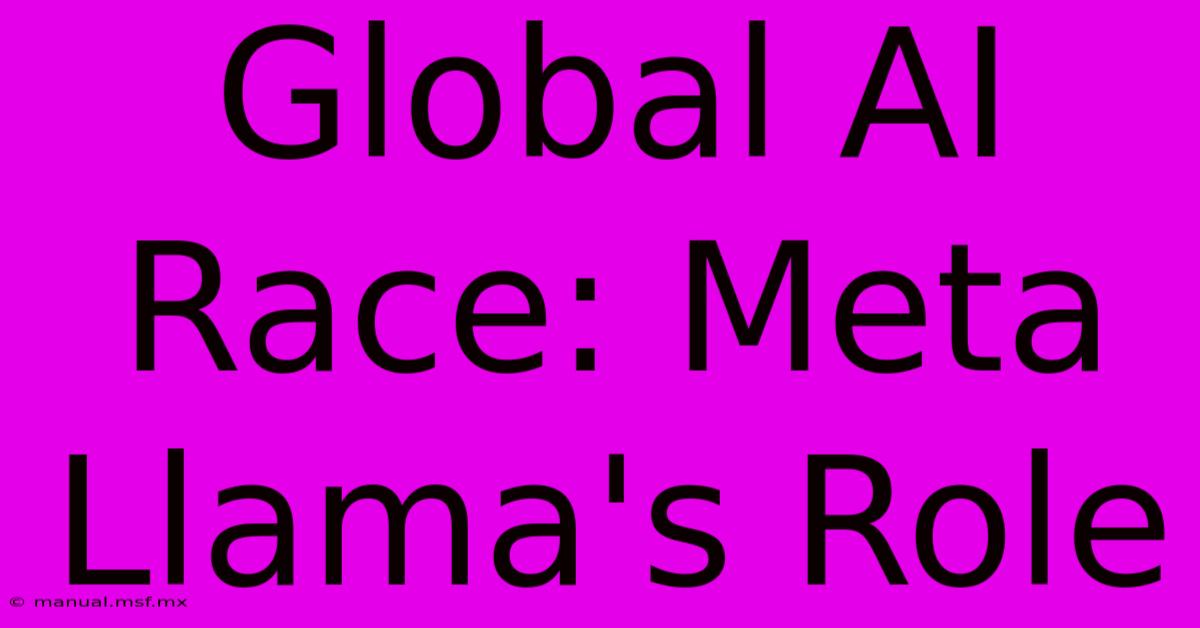Global AI Race: Meta Llama's Role

Discover more detailed and exciting information on our website. Click the link below to start your adventure: Visit Best Website. Don't miss out!
Table of Contents
Global AI Race: Meta Llama's Role - Unlocking the Power of Large Language Models
Is Meta's Llama poised to disrupt the AI landscape? The emergence of powerful language models like Llama has propelled the global AI race to unprecedented heights. This article delves into the significance of Meta's Llama, exploring its potential impact and how it fits within the broader context of the AI revolution.
Editor Note: The rise of Llama and other large language models signifies a pivotal moment in the development of artificial intelligence. This topic is crucial for understanding the future of technology, its implications for society, and how we can navigate the ethical considerations surrounding AI.
The AI landscape is witnessing a fierce competition amongst tech giants vying for dominance in the development of cutting-edge AI technologies. This race is driven by the immense potential of these technologies to revolutionize various industries, from healthcare to finance and beyond. Meta's Llama, a large language model trained on a massive dataset of text and code, emerges as a significant player in this global AI race.
Analysis: To provide a comprehensive understanding of Llama's role, we conducted an in-depth analysis, examining its capabilities, strengths, and potential applications. We also explored its impact on the wider AI ecosystem and its implications for the future of AI research and development.
Key Takeaways of Meta Llama:
| Aspect | Description |
|---|---|
| Open-Source Nature: | Offers accessibility for researchers and developers to build upon and improve the model. |
| Impressive Performance: | Demonstrates strong performance across a range of language tasks, including translation, summarization, and code generation. |
| Focus on Responsible AI: | Meta emphasizes the importance of responsible AI development and deployment, aiming to mitigate potential risks associated with large language models. |
Meta Llama: A Deeper Dive
Open-Source Innovation: Llama's open-source nature distinguishes it from other commercially developed large language models. This approach allows for wider collaboration and accelerated progress in AI research and development. Researchers can experiment with different training datasets, explore novel applications, and work together to refine and improve Llama's capabilities.
Performance and Capabilities: Llama's impressive performance across diverse language tasks showcases its versatility and potential for real-world applications. Its proficiency in tasks like translation, summarization, and code generation has implications for industries like education, customer service, and software development.
Responsible AI Principles: Meta's commitment to responsible AI development is a crucial aspect of Llama's impact. The company emphasizes the importance of addressing potential risks associated with large language models, such as bias, misinformation, and unintended consequences. This focus highlights the need for ethical considerations and responsible practices as AI technology continues to advance.
Conclusion
Meta's Llama represents a significant contribution to the global AI race, demonstrating the potential of open-source collaboration and responsible AI development. By offering access to its powerful language model, Meta has empowered researchers and developers to push the boundaries of AI innovation. As AI technology continues to evolve, Llama's impact on the future of AI is likely to be profound, shaping both research and its practical applications.

Thank you for visiting our website wich cover about Global AI Race: Meta Llama's Role. We hope the information provided has been useful to you. Feel free to contact us if you have any questions or need further assistance. See you next time and dont miss to bookmark.
Also read the following articles
| Article Title | Date |
|---|---|
| Gefragt Gejagt Jetzt Live Auf Mdr | Nov 15, 2024 |
| Overtidseier G18 Moral Pa Bane | Nov 15, 2024 |
| Miastko Fotografie Zniklego Swiata | Nov 15, 2024 |
| Modo Franvarande Vid Shl Aterstart | Nov 15, 2024 |
| Usa Vs Jamaica 2024 Match Analysis | Nov 15, 2024 |
| Nuevo Libro Capitalismo Digital Ua Tx | Nov 15, 2024 |
| No Vax Kennedy Jr Nominato Da Trump | Nov 15, 2024 |
| Brand Uitgebroken Graswijk Assen | Nov 15, 2024 |
| Mavericks Vs Jazz Game Time Tv Info | Nov 15, 2024 |
| Ronan Reacts To Viral Violence Discussion | Nov 15, 2024 |
